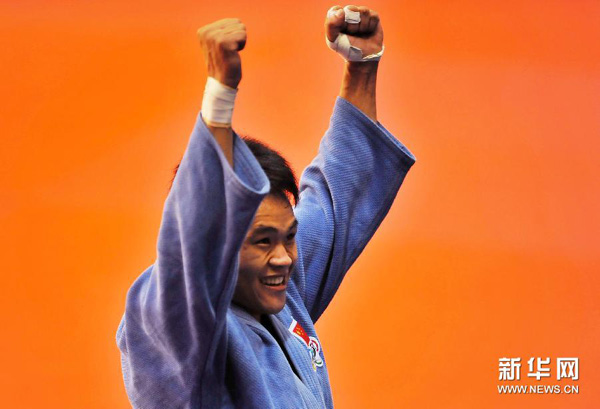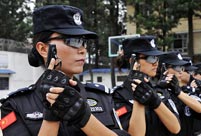 China's new-type guided missile frigate 'Bengbu' in live fire training
China's new-type guided missile frigate 'Bengbu' in live fire training
 China’s weekly story (2013.8.10 - 8.23)
China’s weekly story (2013.8.10 - 8.23)
 Flight team performs first show abroad
Flight team performs first show abroad
 With parents bedridden, 12-year-old boy becomes pillar of the family
With parents bedridden, 12-year-old boy becomes pillar of the family
 Top 10 private Chinese enterprises 2013
Top 10 private Chinese enterprises 2013
 The most gorgeous Chinese women in the eyes of foreigners
The most gorgeous Chinese women in the eyes of foreigners
 |
| Ma Duanbin (Xinhua) |
National Games champion Ma Duanbin stood in the corridor of judo stadium where he successfully defended his men's 66kg title two days ago. Still few spectators recognized him.
One thing Ma has been used to in his seven-year judo career is anonymity.
Judo, introduced into China's all-important National Games 30 years ago, is a relatively young sport in the populous country compared with martial arts, soccer, basketball and table tennis.
It started to win some notice when the Olympics-obsessed Chinese reaped their first judo gold medal through women's athlete Zhuang Xiaoyan in 1992 Barcelona Games.
China has maintained its advantage in women's heavyweight class since then while men's judo usually go unnoticed at international competition. Without even one single Olympic medal, men's judo can hardly draw interest.
Not just judo, many sports including handball, baseball, field hockey all experience the same lack of attention in the country that hails its stars in table tennis, badminton, swimming, basketball and soccer as well as tennis.
In fact, Ma does not care much about how many people know about him. It is the arduous training repeated everyday that he has to endure.
"I feel like life is repeating itself. I do almost the same thing as one day before, running and strength training in the morning and combat skills in the afternoon," said the 23-year-old about his seven-hour training each day.
"Training is monotonous but you can find something fun to do after that. One needs to be adaptable," he added.
Ma lived with his teammates in athletes dormitory in south Beijing. His life followed the track many Chinese athletes were on.
Leaving home in Benxi, Liaoning province at an early age of 16, he joined Beijing team and being an judoka became his full day job.
At first, this profession brought him about 1,200 yuan (about 196 US dollars) plus some bonus each month.
"If you have national titles, your salary will be doubled," he said.
Ma enjoys meals, clothing and a place to live for free, which makes his life easier in the Chinese capital where living expense is much higher than the average level.
But even with two titles from two National Games, Ma still can not afford to buy an apartment of his own.
"The prize money is far less than you imagined. What I have got from these two National Games is not enough to pay for a bathroom in Beijing," he quipped.
The house price in central Beijing has reached 50,000 yuan per square meters and can be as high as 20,000 yuan along the sixth ring road, some 25 kilometers away from the city center.
"If I leave the team and live by my own, I can barely make ends meet," he said.
Ma was asked by his parents to retire after he won in last National Games four years ago.
"They felt bad because they knew how tiresome my training was," said Ma, whose older brother Ma Duanzheng is also a judoka and took a silver in 2005 national games.
"Once I can secure a job, they asked me to retire," he said.
Results at the National Games weigh heavily in government's appraisal of provincial sport bureaus. So athletes are usually promised cash rewards and jobs as an incentive to win at the games.
Ma could have chosen to retire and become a judo coach in Beijing or find an executive position with his 2009 National Games victory.
"I want to continue," he said. "The love of sport keeps me going."
 Mexican president delivers first State of Nation address
Mexican president delivers first State of Nation address Highlights of MAKS 2013 Int'l Aviation and Space Show
Highlights of MAKS 2013 Int'l Aviation and Space Show  10th China-ASEAN Expo opens in Nanning
10th China-ASEAN Expo opens in Nanning Baby born to save his sister - the story of a savior sibling
Baby born to save his sister - the story of a savior sibling Lady of mystery: Female SWAT team in prison disclosed
Lady of mystery: Female SWAT team in prison disclosed  Single mother, baby live in KFC restaurant for months
Single mother, baby live in KFC restaurant for months Top 10 naked hotels in the world
Top 10 naked hotels in the world The most gorgeous Chinese women in the eyes of foreigners
The most gorgeous Chinese women in the eyes of foreigners A collection of bizarre rooftop buildings around China
A collection of bizarre rooftop buildings around China Putin intimate contacts with marine animals
Putin intimate contacts with marine animals China's frigate 'Bengbu'in fire training
China's frigate 'Bengbu'in fire training Fresh students 'forced' to register in university independently
Fresh students 'forced' to register in university independently 2013 Taiwan Int'l Tourism Expo kicks off in Taipei
2013 Taiwan Int'l Tourism Expo kicks off in Taipei Photo story: Take a gap year
Photo story: Take a gap year Nokia's Global Headquarters: visiting a declining empire
Nokia's Global Headquarters: visiting a declining empireDay|Week|Month